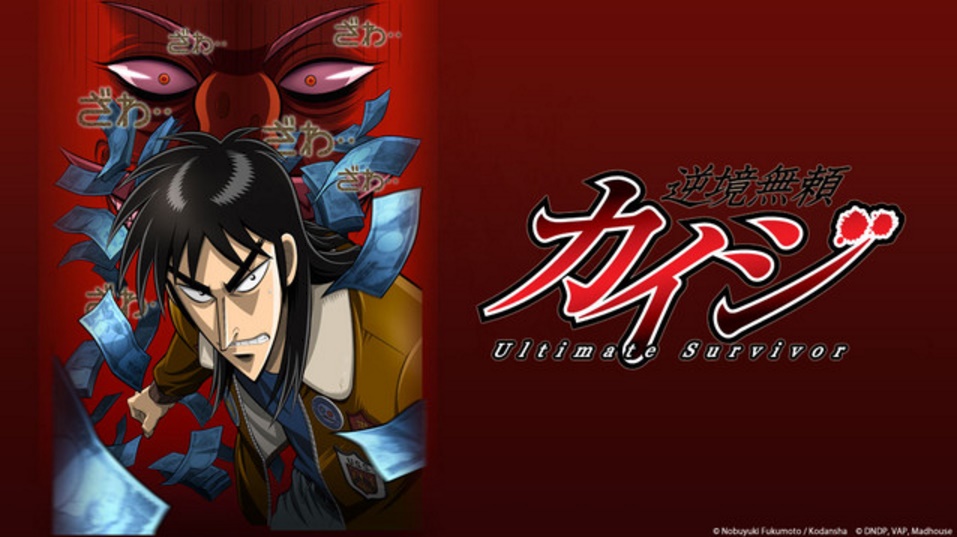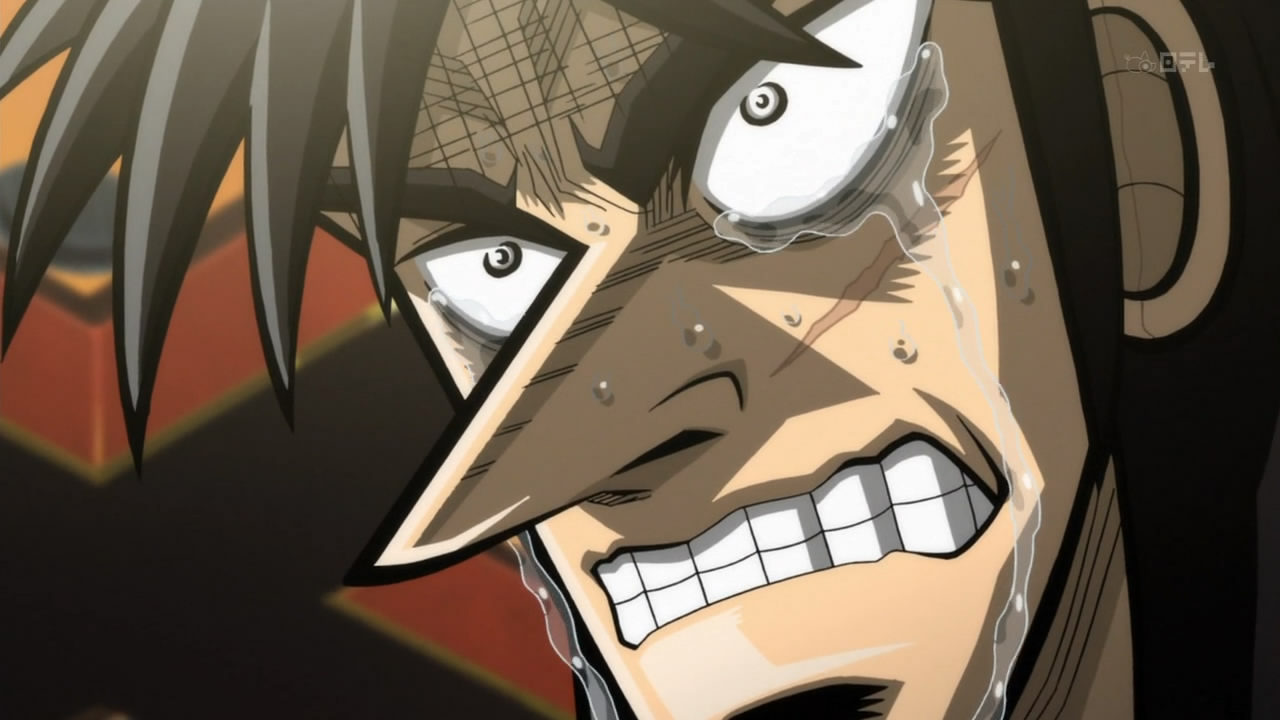Kaiji Review - Card Games on Cruise Ships

Kakegurui is one of the nicer surprises to come out of the summer season. The art direction is great, the dialogue is brilliant, and watching our protagonists deal with the slew of cheats and tricks their opponents throw at them never ceases to entertain. It is an engaging, thrilling show that I wholeheartedly recommend to anyone who’s interested in the premise of after-school high-stakes gambling clubs and the associated chicanery that happens within.
However, despite it using high-stakes gambling as the core idea propelling the action, Kakegurui is not really a gambling anime.
No, I’m not yanking your chain. Yes, I’m being dead serious. You read that correctly. Kakegurui is not a gambling anime.
I won’t spend too long dissecting my claim, but the short answer to why I’ve planted my flag here is twofold. First off, for a gambling game, there has to be some restricted ruleset that the players must adhere to, and that includes some way to punish cheaters and other players trying to win from under the table. Cheating in Kakegurui’s games is very commonplace, to the point where the game is less important that watching how Yumeko manages to find the cheat and overcome it. This kinda yanks the rug out from under any mind games or actual skill that would otherwise be used to play the games. Instead of using knowledge about the game and her opponent to win, Yumeko’s challenge instead lies in figuring out how her foe is cheating and how she turns the tables in her favor.
The other big thing to keep in mind about Kakegurui is that, although the students are gambling and they make some pretty high-stakes wagers to that end, there’s no real sense of impact whenever someone loses a game. Sure, they’re ridiculed by the rest of the school and that can be seen as a sort of mental and emotional bet, but as it’s demonstrated in the first episode, other students can buy the freedom of the “dogs and cats” in one of their games. And whenever large bets are placed, there’s no sense of weight of significance to the amounts levelled by the players. All we know about most of the cast is that they’re filthy friggin' rich, and whatever losses they do incur are often just drops in the bucket compared to whatever their source of income is, whether it be a family company or inheritance. Consequently, it’s hard to connect with the stakes of any one game, since it’s effectively just a number to the players. Sure, 1.62 million yen is a lot of money (roughly $15,000), but it’s a lot more impactful watching someone in dire finanical status desperately needing to win a game wager that, as opposed to a wealthy high-school student who probably gets that amount every day for lunch money.

This is a smile nobody attains through normal means.
“Jeesh, SnYves, you must be fun at parties. How much nitpicking can you do on a regular basis?” I’m not always like this, reader. And let me reiterate that Kakegurui is still a really fun show regardless of what I think about its gambling premise. But it did make me jump back to Crunchy to see if there were more gambling anime that I needed to get caught up on. The first one I bumped into was Akagi, the 2005 Madhouse adaptation of the manga by Nobuyuki Fukumoto. And while I was definitely engaged by the show’s story, plot development and character beats, my experience was dampened by the fact that I know as much about mahjong as I do the lyrics to Russian pop songs.
So I regrettably had to toss Akagi out the door until I got caught up on my Boyle’s, but then Crunchy ran after it like a dog after a thrown stick, and returned with Kaiji: same author, same studio, a couple years later. And now instead of following a soft-spoken definitely-fifteen-year-old mahjong mastermind, we get Kaiji Itou (Masato Hagiwara, who of course also voiced the titular Akagi), a drunk, stealing, gambling mess who gets roped into paying off a massive debt left behind by one of his friends. With no way to quickly attain the cash, he decides to participate in a gambling contest on board a cruise ship, where the penalty for losing is effectively enslavement. And so begins a 26-episode saga all about Kaiji brewing up strategies, reading his opponents, playing out mind games, and doing his best to come out on top in his new dog-eat-dog home.
So we already have the characters, the stakes, the plot and the game, and all that’s left is the action. And…holy hell does Kaiji make it work. This series is really, really good at what it does, and I was on the edge of my seat during the entire first arc of the show.
While I love me my Kakegurui, I think Kaiji really brings it home in terms of its narrative and its characters, and sticks the gambling anime motifs in ways other shows don’t quite get. Kaiji addresses the two big weaknesses I brought up previously, and in doing so enhances the on-screen action and dramatic weight that is required for this type of show to work.

He just activated my Trap Card!
The best way I can probably describe a show like Kaiji is, “What if Conan Edogawa took up Magic the Gathering?” Kaiji, despite being a victim of his own undoing socially, is actually an incredibly intelligent and insightful protagonist. Every move he takes is calculated, strategic, and well thought-out, but not so vague and long-winded to the point where it sounds like he just pulled a winning strategy for the game out of thin air. This is one of the problems encountered when you want to make your protagonist have these Holmesian “aha!” moments; it’s very easy to make your character feel omniscient as opposed to insightful.
Whenever Kaiji brews up a new strategy for beating a game, it never feels like his findings aren’t something the audience could have come up with after a few minutes of thinking. His schemes feel like he actually did think them up on the spot and he’s just trying to improve his odds, which is kinda the point of gambling in general.
And whenever something does go wrong in this show, and this happens quite a bit, we feel it as an audience. The gravitas of potentially losing your livelihood entirely to go work as an indentured servant feels all the more daunting when we see just how badly the gamblers want to avoid the penalty. Kaiji in particular is a victim of getting screwed over by other people time and time again, so when we see his plans shudder and sometimes crumble in front of him due to reasons outside his control, we feel that weight alongside him. This makes him more empathetic for the audience, as we don’t want to see him being subjugated to that lifestyle, even though he’s done next to nothing to contribute to soceity before now. And this bond is certainly the result of many of us knowing what the human struggle can be like in this respect; only with determination and perseverance can we overcome and begin fresh.

Out of context screenshot is out of context!
Of course, Kaiji’s strong and realistic characters are nothing without a good script to back it, and the writing for this show is simply excellent. I did mention that Kaiji has a way of constantly getting the rug yanked from under him, but even the people who do screw him over have understandable motivations behind their actions. Hell, even the people who seem to be acting out of their own selfish needs have perfectly understandable logic backing their conclusions, and in a way, even though we’ve come to despise those characteristics as “bad” traits, it’s hard not to get where they’re coming from.
Kaiji is a show all about survival, tough decisions, and betrayal, and the entire cast works to emulate those themes throughout the series. In doing this, Kaiji raises a large number of questions regarding loyalty, pack mentality, and alliances. There is so much to unpack and talk about in regards to this show that I think I might end up dedicating an editorial to it later on.
Presentationwise, Kaiji is not too bad of a looker either. Hagiwara’s art style is immediately recognizable for anyone who’s read the manga, and the rough way everything seems to be drawn reminds me a bit of ONE’s work on One Punch Man and Mob Psycho. It is by no means the prettiest show to come out in 2009, but its instantly memorable character designs and motifs (Hagiwara likes to write “zawa” in hirigana to denote stress, see also JBA) make it immediately recognizable.

Kaiji mugs for the camera like it’s nobody’s business.
I have absolutely no reason not to recommend Kaiji to anyone who likes tense drama with gambling as the central theme. This show accomplishes everything it sets out to do: it tells a great, compelling story with sympathetic and clever characters, and dishes out plenty of thought-provoking questions and memorable “action” scenes to ensure it leaves an impact on the audience. I’m actually kinda surprised that, for a 2007 show, it doesn’t have a larger fanbase than it already does. To be fair, this was also the year of Clannad, Zatsubou Sensei, Baccano!, Higurashi, Darker than Black, Dennou Coil, and Gurren friggin' Laggan, but if anything that should just go to reinforce my point.
Kaiji, it’s fair to say, is a hidden gem of 2007, and if you haven’t heard of this show in the wake of Kakegurui this season, well, now you have your homework assignment for next week.

THE VERDICT: A+ Next time: I take a request